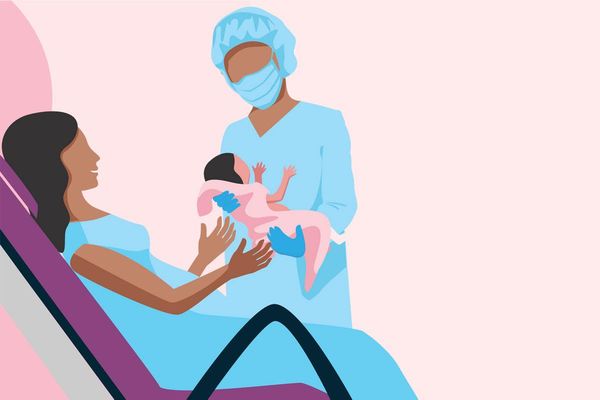Pregnancy affects every part of your body—from your hair to your toenails. Here's what to expect and what to do about it.
HOW FAR ALONG ARE YOU? 8 Weeks Pregnant Symptoms
Your breasts. Early in your pregnancy they will feel tender and may be larger. As the pregnancy progresses and your breasts prepare for breastfeeding, they get even bigger and may leak an early form of milk called colostrum. Make sure you wear a well-fitting bra that provides both comfort and support. If your breasts are tender, ask your partner not to touch them.
Congestion. The higher blood volume of pregnancy can lead to congestion and runny noses. Try using a saline spray to clear out the mucus, or a neti pot, a small device available in health food stores that squirts water through your nose.
Frequent urination. If you know the location of every bathroom between your house, the supermarket, work and the mall, don't despair. Your blood volume increases during pregnancy, putting increased pressure on your kidneys. Plus, later in pregnancy the weight of the baby on your bladder increases the pressure, making you feel like you always have to go.
Mouth and tooth changes. Your body needs extra calcium for the baby; if you don't provide it through your diet, it will steal it from your bones and teeth (hence the old wive's tale about losing a tooth for every child). You may also find that your gums bleed more easily, thanks to pregnancy hormones. Get your teeth and gums checked early in your pregnancy (no x-rays, of course), and follow good dental care with regular brushing and flossing.
Aches and pains. During pregnancy, ligaments and tendons throughout your body stretch, both to accommodate the growing baby and to allow the baby out during labor. This can lead to achiness and even pain, particularly in the lower abdomen. You may also experience carpal tunnel syndrome in one or both hands, caused by compression of the nerves that carry signals to the hand and fingers. Acetaminophen or ibuprofen can help, as can exercise. Ibuprofen is generally not recommended after 28 weeks.
Shortness of breath. By the end of your pregnancy, with the baby pressing up against your diaphragm, you may feel as if you can't get enough air. This is called dyspnea, or shortness of breath. It's also a sign to slow down. If you feel uncomfortable, find a position (lying on your side?) that allows you to breathe more deeply.
Constipation. Thank those pregnancy hormones again for this symptom. Try to avoid straining, as that can lead to hemorrhoids. Instead, follow basic advice for constipation: Get regular exercise, drink plenty of water and up the fiber in your diet. If you still feel constipated, try a stool softener like Colace, an over the counter medication that can help relieve hemorrhoids.
Heartburn and gas. Blame the crowded space in there for this symptom, which most pregnant women experience in the third trimester. The pressure of the uterus on the stomach, coupled with the relaxation of the valve between the stomach and esophagus, allows stomach acid to "reflux" into your throat. Over-the-counter heartburn options like Tums, Mylanta and Mylanta Gas are considered safe during pregnancy.
Leg cramps. You may experience sudden leg cramps, feel that something is crawling on your legs or have an uncontrollable urge to move your legs, particularly at night. This symptom may be caused by low iron or potassium. Stretching your legs before bed and getting regular exercise can help; you might also try adding a potassium-rich banana to your diet. Ask your health care professional to test your iron levels; if they are too low, you may need a higher iron supplement.







